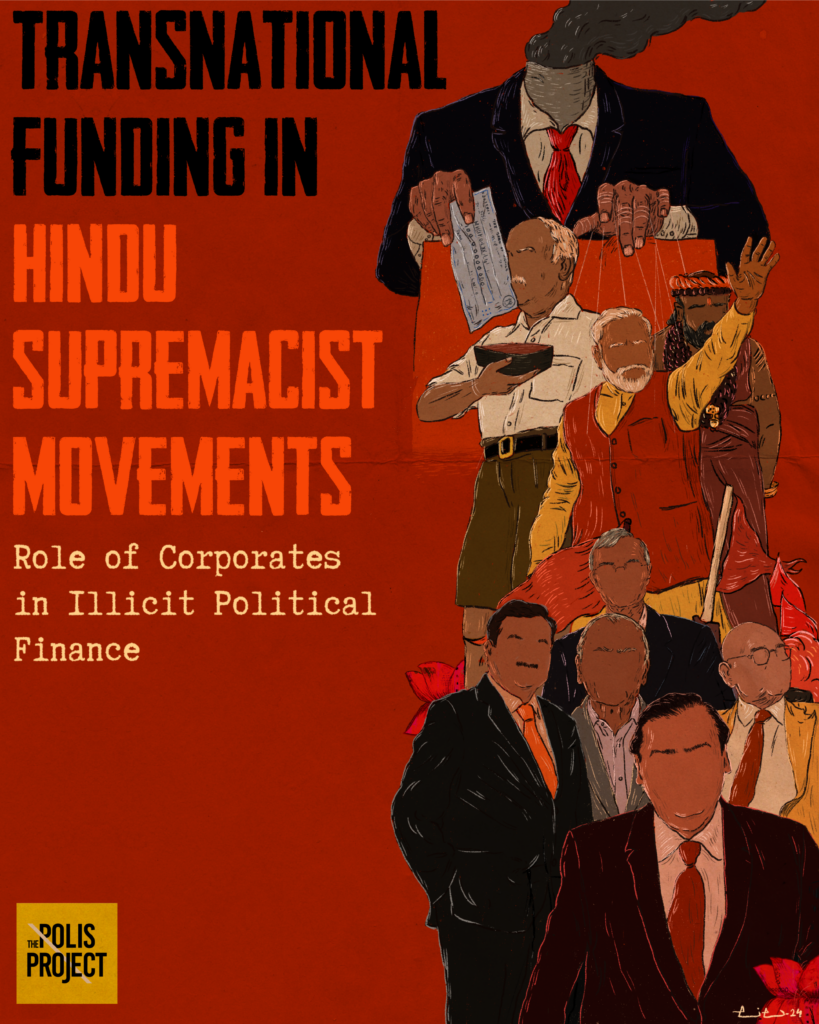
Transnational Funding in Hindu Supremacist Movements: Role of Corporates in Illicit Political Finance

With India entering its third term under the rule of Narendra Modi, it is more important than ever to examine the illicit finance behind Hindu supremacist movements. As a prime minister closely associated with billionaire tycoons and who has overseen an unprecedented surge in political finance in the country, it is worth scrutinising the role, scale and sources of financial flows behind Modi, the Bharatiya Janata Party and their Hindu nationalist agenda. Therefore, this scoping paper, first published by The Polis Project in August 2024, offers a preliminary understanding of the vast network of illicit political finance behind Hindu supremacist movements, outlining the key players and policies involved in these flows, as well as highlighting the adverse intersectional impacts on oppressed, minority communities.
The report first establishes the urgency of looking at Modi and his financial flows by highlighting the role of illicit political finance in his rise to power. It shows that for over two decades now, Modi has embraced a governance of crony capitalism, establishing a quid pro quo relationship in which business houses benefit from favourable fiscal policies, investment incentives and project allotments. In return, Modi has been able to rely on corporate support and cultivate an image of the “development man” that he uses to shift focus away from his violent and virulent Hindu nationalism.
The first chapter illustrates how Modi adopted this tactic in Gujarat, with his flagship business summit, Vibrant Gujarat, and its role in resurrecting his image after the Gujarat pogrom of 2002. It also highlights the crony capitalism under Modi in Gujarat, especially with the business houses run by the Gujarati industrialists, under Gautam Adani, the Ambanis and the Ruias. The paper then examines two policies that are perhaps the most significant contributors to illicit political finance in India— electoral bonds and electoral trusts. The two schemes combined allowed the BJP to build up a treasure chest of INR 12,930 crore— over USD 1.5 billion—from anonymous corporate and individual donations—between 2018 and 2023. The chapter demonstrates the scale of illicit corporate financing behind these donations, identifying the different companies that have donated millions of dollars to the BJP. Further, the illicit nature of these donations, as well as the weaponization of political finance, is established by the quid pro quo relationship of these payments, with numerous companies making donations in response to scrutiny by investigative agencies.
In the third chapter, the report unpacks the expansive global network of financial flows behind Hindu supremacist movements. Across these international Hindu nationalist organizations—the Global Sangh—a pattern emerges reflecting the Rashtriya Swayamsevak Sangh’s success in reproducing its organizational structures abroad while maintain the primacy of its Indian counterparts. The Global Sangh primarily operates through numerous multi-million-dollar tax-exempt charitable organizations — in particular in the United States, United Kingdom and Canada. These Hindutva charities are often interconnected with each other through other organizations, financial structures and individuals. The chapter identifies four central organisations in the Global Sangh—namely, the Hindu Swayamsevak Sangh, the Vishwa Hindu Parishad, Sewa International, and the Ekal Vidyalaya Foundation. It looks at the financial flows of these organisations across four countries where the Global Sangh is most powerful and well-established: the United States, the United Kingdom, Canada, and Australia. These organisations funnel millions of dollars into initiatives in their own respective countries and into India, which are masked as charitable purposes, but effectively serve Hindu supremacist agendas, such as educational initiatives that indoctrinate children into the Hindutva movement. While the source of funding for these organisations remains undisclosed owing to their status as charitable foundations, the report identifies certain corporations that are run by the same families behind the charities to trace their financial flows.
Finally, the paper lays special emphasis on studying the intersectional impact of Hindutva funding flows. It uses three frameworks to study this impact, by looking at how Hindutva disproportionate discriminates against religious minorities such as Muslims and Christians, the oppressed caste Dalit communities, and the indigenous Adivasi communities. The report shows how the Hindu supremacist financial flows are used in anti-Muslim initiatives not just in India, but globally as well. In the context of caste, the report spotlights the immense funding behind the Hindu nationalist movement in the United States to exclude the discourse on the oppression of Dalits within Hinduism from the academic curriculum. The chapter then looks at the indoctrination of children from indigenous tribal communities, and how the Modi regime enabled the destruction and acquisition of their lands, in violation of forest conservation laws, to allow extractivist mining projects.
Read the full report here:
 Loading…
Loading…
Related Posts
With India entering its third term under the rule of Narendra Modi, it is more important than ever to examine the illicit finance behind Hindu supremacist movements. As a prime minister closely associated with billionaire tycoons and who has overseen an unprecedented surge in political finance in the country, it is worth scrutinising the role, scale and sources of financial flows behind Modi, the Bharatiya Janata Party and their Hindu nationalist agenda. Therefore, this scoping paper, first published by The Polis Project in August 2024, offers a preliminary understanding of the vast network of illicit political finance behind Hindu supremacist movements, outlining the key players and policies involved in these flows, as well as highlighting the adverse intersectional impacts on oppressed, minority communities.
The report first establishes the urgency of looking at Modi and his financial flows by highlighting the role of illicit political finance in his rise to power. It shows that for over two decades now, Modi has embraced a governance of crony capitalism, establishing a quid pro quo relationship in which business houses benefit from favourable fiscal policies, investment incentives and project allotments. In return, Modi has been able to rely on corporate support and cultivate an image of the “development man” that he uses to shift focus away from his violent and virulent Hindu nationalism.
The first chapter illustrates how Modi adopted this tactic in Gujarat, with his flagship business summit, Vibrant Gujarat, and its role in resurrecting his image after the Gujarat pogrom of 2002. It also highlights the crony capitalism under Modi in Gujarat, especially with the business houses run by the Gujarati industrialists, under Gautam Adani, the Ambanis and the Ruias. The paper then examines two policies that are perhaps the most significant contributors to illicit political finance in India— electoral bonds and electoral trusts. The two schemes combined allowed the BJP to build up a treasure chest of INR 12,930 crore— over USD 1.5 billion—from anonymous corporate and individual donations—between 2018 and 2023. The chapter demonstrates the scale of illicit corporate financing behind these donations, identifying the different companies that have donated millions of dollars to the BJP. Further, the illicit nature of these donations, as well as the weaponization of political finance, is established by the quid pro quo relationship of these payments, with numerous companies making donations in response to scrutiny by investigative agencies.
In the third chapter, the report unpacks the expansive global network of financial flows behind Hindu supremacist movements. Across these international Hindu nationalist organizations—the Global Sangh—a pattern emerges reflecting the Rashtriya Swayamsevak Sangh’s success in reproducing its organizational structures abroad while maintain the primacy of its Indian counterparts. The Global Sangh primarily operates through numerous multi-million-dollar tax-exempt charitable organizations — in particular in the United States, United Kingdom and Canada. These Hindutva charities are often interconnected with each other through other organizations, financial structures and individuals. The chapter identifies four central organisations in the Global Sangh—namely, the Hindu Swayamsevak Sangh, the Vishwa Hindu Parishad, Sewa International, and the Ekal Vidyalaya Foundation. It looks at the financial flows of these organisations across four countries where the Global Sangh is most powerful and well-established: the United States, the United Kingdom, Canada, and Australia. These organisations funnel millions of dollars into initiatives in their own respective countries and into India, which are masked as charitable purposes, but effectively serve Hindu supremacist agendas, such as educational initiatives that indoctrinate children into the Hindutva movement. While the source of funding for these organisations remains undisclosed owing to their status as charitable foundations, the report identifies certain corporations that are run by the same families behind the charities to trace their financial flows.
Finally, the paper lays special emphasis on studying the intersectional impact of Hindutva funding flows. It uses three frameworks to study this impact, by looking at how Hindutva disproportionate discriminates against religious minorities such as Muslims and Christians, the oppressed caste Dalit communities, and the indigenous Adivasi communities. The report shows how the Hindu supremacist financial flows are used in anti-Muslim initiatives not just in India, but globally as well. In the context of caste, the report spotlights the immense funding behind the Hindu nationalist movement in the United States to exclude the discourse on the oppression of Dalits within Hinduism from the academic curriculum. The chapter then looks at the indoctrination of children from indigenous tribal communities, and how the Modi regime enabled the destruction and acquisition of their lands, in violation of forest conservation laws, to allow extractivist mining projects.
Read the full report here:
 Loading…
Loading…
SUPPORT US
We like bringing the stories that don’t get told to you. For that, we need your support. However small, we would appreciate it.




